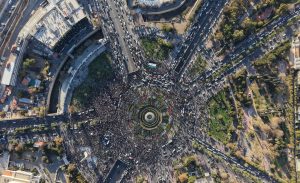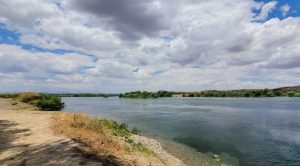It has been more than a month since peaceful #EndSars protesters were gunned down by Nigerian military forces at Lekki tollgate on October 20, 2020. Both the national and international outrage and demands for justice were immediate, yet the Nigerian government’s response has been anything but.
In his first public address following the incident, President Buhari neglected to so much as mention the shooting. In a follow-up address a few days later, President Buhari clarified that his omission was due to not yet having all the facts but promised justice for those killed in the incident. Nearly five weeks later, no “facts” have been established. There has been no conclusive government investigation. No accountability. The Nigerian military initially denied being present at the tollgate. Subsequently, they admitted the presence of soldiers, but claimed they only fired blanks into the air. In a further twist, a Nigerian military representative testified last week before a Lagos Judicial panel of inquiry that both live and blank bullets were given to soldiers and that the orders to clear the tollgate came from Governor Sanwo-Olu of Lagos State. In his own statement, the governor stated that the military is not under the jurisdiction of state governors. The volleying of blame has sustained confusion as to who bears true responsibility for the military assault. Despite its failure to establish culpability in the slaughter of its citizens, the federal government found ample time to write a letter lambasting CNN’s investigative report that concluded military personnel had in fact shot at peaceful protesters in Lekki. Unfortunately, all of this is predictable for a notoriously corrupt and apathetic government.
While the Nigerian government continues to fumble and mismanage the fallout from the Lekki Massacre, the punitive actions against protesters and activists continue. Earlier this month multiple bank accounts were reportedly frozen by the Central Bank due to their connection to #EndSars protests. Among those affected are Bolatito Racheal Oduala, Chima David Ibebunjoh, Mary Doose Kpengwa, Saadat Temitope Bibi, Bassey Victor Israel, Wisdom Busaosowo Obi, Nicholas Ikhalea Osazele, Ebere Idibie, Akintomide Lanre Yusuf, Uhuo Ezenwanyi Promise, Mosopefoluwa Odeseye, Adegoke Pamilerin Yusif, Umoh Grace Ekanem, Babatunde Victor Segun, Mulu Louis Teghenan, Mary Oshifowora, Winifred Akpevweoghene Jacob, Idunu A. Williams, and Victor Solomon. Another instrumental activist, Eromosele Adene, was detained for 12 days without official charges before finally being granted bail and released on November 19.
Through its rhetoric, the government feigns compassion for its citizens, but consistently falls short on action. The government has shown an alarming commitment to deterring further #EndSars protests. From utilizing the military to freezing bank accounts, it freely exploits any system at its disposal to threaten, punish, and bully activists. For all its promises regarding disbanding SARS and securing justice for victims, the Nigerian government’s actions have displayed only a firm intent to maintain the status quo and silence any opposition.
Some Nigerians have literally put their money where their mouths are by closing their bank accounts at complicit banks. This represents an act of meaningful solidarity, and show of resistance to the banks’ cooperation with the government’s crackdown. But the core problem remains— the government’s unchecked overreach. This overreach is so dangerous that it has forced banks to alienate their law-abiding patrons and consequently lose business.
Who will be the next pawns in the government’s betrayal of its citizens? What would it take for the government to stop harvesting victims from its citizens–and learn to do right by them instead?












Be First to Comment